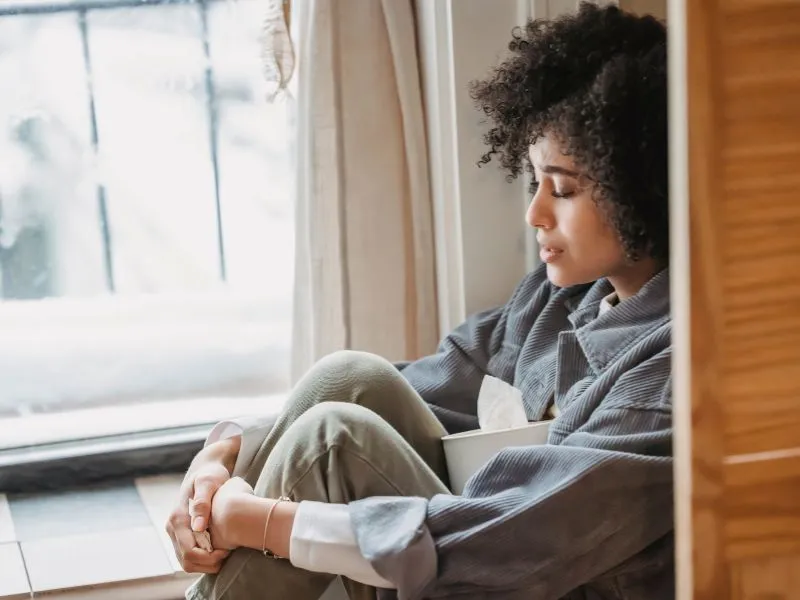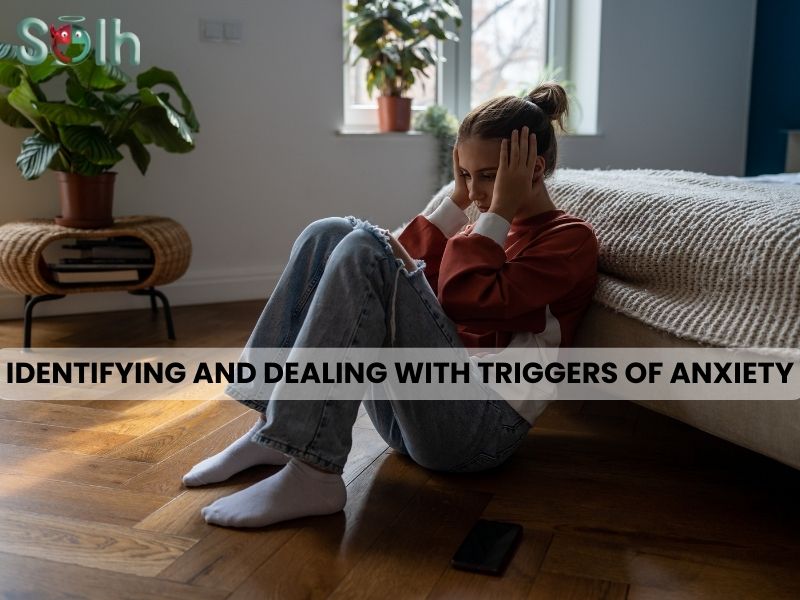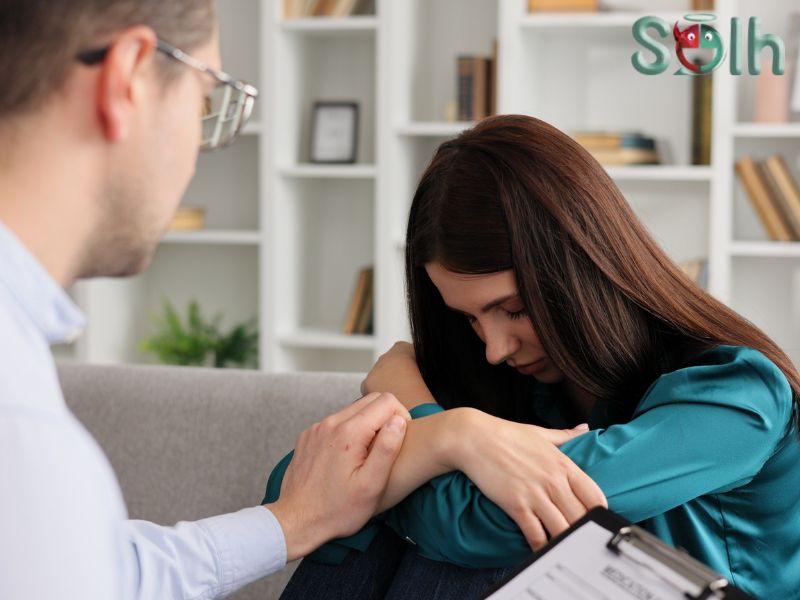"It's okay to be scared. It's okay to feel the way you are feeling. Your feelings are validated!"
Anxiety is a common companion for most people in today's fast-paced society. It is not surprising that it is one of the most common diagnoses in a world where mental health awareness is increasing. While the occasional bout of anxiety is completely normal, it's not normal for it to ruin your day-to-day activities where it drains your energy, interferes with sleep, and wears your body out.
Anxiety is a mental health issue that can make a person feel worried, afraid, or anxious. Anxiety for some people might also result in physical pain like chest pain and panic attacks. Anxiety triggers can be different for each person. Most people discover that they have several triggers. However, anxiety attacks can occur for no apparent reason in some people also. Therefore, it's crucial to identify any anxiety triggers you may have. The first step in managing your triggers is to recognise them.
External events trigger a resulting chain of events inside you- this can be explained by a scientific fact-
"The first law of thermodynamics, also known as Law of Conservation of Energy, states that energy can neither be created nor destroyed; energy can only be transferred or changed from one form to another."
Your surroundings have an impact on your perceptions and thoughts. When an outside stimulus prompts a thought, your brain sends out a series of impulses. Your emotions, physical sensations, and behaviors are then influenced by your thoughts, depending on how you choose to think about it. When you start to experience anxiety it can feel like it is never going to stop.

Symptoms of Anxiety : A Deeper Look
Anxiety is a common emotion, but when it becomes overwhelming and interferes with daily living, it may be crippling. Here's a closer look at some common anxiety symptoms and how they can manifest:
Restlessness: It can feel like an ache inside you that you can't scratch. You may pace back and forth, fidget with items, or have trouble sitting still. It's as if your body is continually on high alert, even when no danger exists.
Impending Doom or Panic: This is a strong apprehension or anxiety that something horrible will occur, even if there is no evidence to justify it. It might strike abruptly and seem overwhelming, like a tsunami of panic crashing over you.
Increased Heart Rate: During an anxiety attack, your body enters fight-or-flight mode. This causes the release of adrenaline, which might cause your heart rate to increase. You may feel like your heart is hammering in your chest or racing a mile a minute.
Hyperventilation: It is also known as rapid breathing which may feel like you can't catch your breath or aren't receiving enough air. This can cause dizziness, lightheadedness, and even chest tightness.
Sweating: Anxiety, like an increased heart rate, can cause you to sweat, particularly in your palms, armpits, and forehead. This is an additional physical response to the fight-or-flight reflex.
Trembling: Anxiety can cause your muscles to tighten and shake. During a panic episode, you may notice slight tremors in your hands and fingers, as well as full-body trembling.
Weakness or Fatigue: Anxiety's persistent state of attention and physical strain can drain and deplete you. You may struggle to focus on work or be too fatigued to get out of bed.
Numbness: During anxiety episodes, some people feel numbness or tingling in their hands, feet, or faces. This is triggered by changes in blood flow when your body diverts resources to deal with the perceived threat.
Difficulty Concentrating: Anxiety causes your mind to race with anxieties and intrusive ideas. This can make it difficult to focus on anything else, including job, study, and even ordinary interactions.
Common Anxiety Triggers
Anxiety can lurk in the shadows, triggered by seemingly ordinary situations. Here's a breakdown of some common culprits that can send your anxiety levels soaring:
Sleep Deprivation: When you don't get enough sleep, your brain has trouble regulating emotions. This can increase your susceptibility to anxious thoughts and physical signs such as racing heart or quick breathing. Aim for 7-8 hours of quality sleep per night to keep your anxiety under control.
Excessive Coffee Consumption: While coffee might provide a momentary energy boost, drinking too much of it can backfire. Caffeine is a stimulant that can activate your nervous system, imitating anxiety symptoms such as jitteriness, restlessness, and racing heart. Be aware of your coffee consumption, and try switching to herbal teas in the afternoon and evening.
Relationship Stress: Disagreements, conflicts, or ambiguity in your relationships can cause significant anxiety. The emotional upheaval can make you feel on edge and concerned about the future of your relationship. Effective communication and appropriate relationship management are essential for lowering this worry.
Financial Concerns: Financial troubles can be a significant stress. The pressure of mounting bills, job insecurity, or debt can cause anxiety and make it difficult to relax. Creating a budget, looking for ways to boost income, and obtaining financial advice might help lessen this strain.
Solitude or Social Exclusion: Some people enjoy being alone, whereas others find social isolation to be triggering. Feeling lonely or excluded can lead to rumination (dwelling on negative ideas) and feelings of inadequacy, which exacerbate anxiety. Building a strong social support network and engaging in enjoyable activities can help combat this.
Pondering Past Experiences: Dwelling on previous mistakes, regrets, or traumas can trap you in a negative loop of feelings. Mindfulness activities such as meditation and cognitive behavioral therapy can help you learn to let go of the past and concentrate on the present moment.
Overthinking: Our minds are excellent problem solvers, but they may occasionally go into overdrive. Overthinking can lead to catastrophic thinking (imagine the worst-case scenario) and increase anxiety. Techniques like as journaling and scheduling worry times can help with this.
Self-Neglect: Taking care of yourself, both physically and emotionally, is critical for managing anxiety. When you ignore your requirements, whether by skipping meals, not exercising, or neglecting your mental health, you become more vulnerable to worry. Prioritize self-care activities such as good food, exercise, and relaxation techniques.
Skipping Meals: Food provides energy for your body and brain. When you miss meals, your blood sugar levels fall, which can cause weariness, irritation, and problems concentrating. All of these causes can lead to anxiety. Aim for consistent, balanced meals throughout
Drugs: Some drugs can cause anxiety as a side effect. If you're experiencing higher anxiety after taking a new drug, consult your doctor. They may be able to alter your dosage or prescribe another medicine.
Burnout: It can occur when you feel overwhelmed, exhausted, and cynical about your work. Chronic stress can cause anxiety, making it difficult to focus, relax, or sleep. Set boundaries, use relaxation techniques, and seek expert help to combat burnout.
Insomnia: Being unable to sleep can be both a cause and a result of anxiety. The frustration of being unable to fall or keep asleep can exacerbate anxiety, and vice versa. Establishing a pleasant evening ritual, following excellent sleep hygiene, and dealing with underlying worry might enhance sleep.
Social Events: Social gatherings can cause significant anxiety for some people. The anxiety of being judged, making small talk, or entering busy areas can be overpowering. If social events are intimidating, start small, practice relaxation techniques beforehand, and concentrate on connecting with just one or two individuals you are comfortable with.
Post-traumatic Stress Disorder (PTSD): Trauma can have a long-term influence on your mental health, and anxiety is a common sign. Flashbacks, nightmares, and intrusive thoughts can be quite distressing. If you have been through a traumatic event, you should seek professional therapy from a PTSD therapist.
Tips to deal with your Anxiety Triggers:
You can attempt to prevent them and cope if you can recognise and comprehend your triggers. You can pick up certain coping mechanisms to use when the triggers arise.
Journaling Power: Keep track of your nervous moments. Make a note of any previous situations, thoughts, or feelings. Over time, patterns will emerge, allowing you to pinpoint your triggers.
Therapist's Advice: Consider receiving professional help from a counselor. They can utilize effective strategies such as cognitive behavioral therapy (CBT) to identify underlying triggers and create personalized coping mechanisms.
Honesty is key: Be open with yourself. Recognize your triggers and how they make you feel. Denial simply feeds the flames.
Positive self-talk: It involves challenging negative beliefs with soothing affirmations. substitute "I can't handle this" by "I've gotten through tough situations before, and I can do this too!"
Shift Your Focus: When anxiety comes, engage in things you enjoy. Listen to soothing music, read a book, or do something that needs concentration.
Unwind with Yoga: Yoga includes physical postures, breathing exercises, and meditation - a potent combination for lowering anxiety and boosting relaxation.
Prioritize rest: Aim for 7-8 hours of good sleep per night. When you're well rested, you're better able to deal with stress and triggers.
Limit your intake: Consumption of coffee, alcohol, and cigarettes should be limited as these might worsen anxiety symptoms. Consider lowering or removing them from your routine.
It's time to get assistance if you think you worry excessively or if you think you could have an anxiety problem. With Solh Wellness App track your feelings of anxiety through mood meter and start paying attention to your mood and what events trigger certain thoughts and emotions for you.
Know that it's OK to talk to others about your anxiety and that you're not alone. The best way out of anxiety is often to expose yourself to the things you are afraid of.



